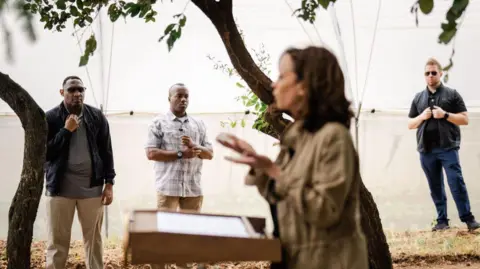Withdrawal of Kamala Harris' Security Detail Raises Questions and Concerns
The recent decision to end former Vice President Kamala Harris' Secret Service protection has sparked controversy. Critics argue it may be politically motivated, while experts suggest practical considerations play a role.
President Donald Trump has cancelled former Vice President Kamala Harris' Secret Service detail, seven months after she left office following her unsuccessful presidential campaign. By law, the US Secret Service provides former vice-presidents and their families with six months of protection after their terms end. However, this term can be extended, which former President Joe Biden reportedly did before leaving office.
The move has drawn criticism, with figures such as California Governor Gavin Newsom and Los Angeles Mayor Karen Bass alleging the decision is politically charged.
Thus far, neither Biden nor Harris has provided commentary on the reasons behind the protection extension, but reports indicate Biden opted for an additional year of protection using undisclosed directives. Legally, the decision falls within his rights, as a law enacted in 2008 allows for Secret Service protection to extend beyond six months based on specific considerations and conditions.
According to sources linked to CBS, a recent threat assessment concerning Harris did not reveal alarming information that would justify an extension of her security arrangements. Nevertheless, there are those in Harris' circle who remain uneasy about her safety as she is both the first woman and person of color to serve as vice president, and has been a target during a heated election cycle.
Throughout her time in office and as a candidate, numerous threats were made against her, with individuals arrested for making online threats. The withdrawal of her security detail occurs just weeks before she embarks on a multi-city promotional tour for her book, '107 Days,' highlighting her short-lived presidential campaign.
Experts note the importance of Secret Service protection which encompasses not just the visible agents accompanying a protectee, but also includes securing residential locations, installing security systems, and assessing potential threats, often leveraging social media analysis.
The discussion also raises questions regarding political retribution, as some allies of Harris are voicing concerns that the decision aligns with Trump's pattern of ending protections for certain individuals, including both allies and critics during his presidency. However, some analysts argue that the Secret Service's limitations and prioritization of immediate threats shed light on the practical considerations behind the withdrawal.
In contrast to vice-presidents, former presidents are ensured protection for life. Only one former president, Richard Nixon, has declined such security. The comparison draws additional attention to inherent discrepancies in how security provisions are applied among various ranks of political leadership.




















